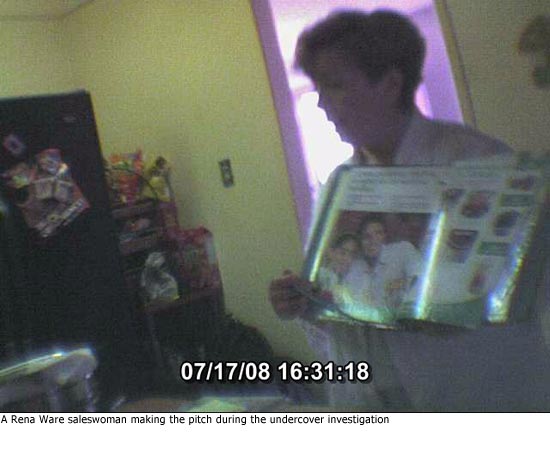Rattling those shady pots & pans sales
July 22, 2010
It was time to blow the lid off the scam.
After receiving numerous complaints, investigators with the county’s Department of Consumer Affairs decided to go undercover to prove that agents of a direct-sales cookware company were making outlandish claims about their expensive pots and pans. Among those claims: that the company’s cookware could help prevent cancer, diabetes and Alzheimer’s.
Posing as potential customers, the investigators secretly videotaped agents for Rena Ware International Inc. employing high-pressure scare tactics, claiming that people might get sick unless they bought kitchenware sets costing from $1,000 to $4,000.
“The saddest thing is that the customers were mostly low income people, and many of them took on huge debt,” said Rigo Reyes, the department’s acting director who took part in the undercover operation.
The Rena Ware investigation, conducted with the state’s attorney general and the Los Angeles County district attorney, led to a civil suit against the company that was settled earlier this month. The Redmond, Wash.-based company admitted no wrongdoing but agreed to pay $625,000 in penalties, costs and fees, including $250,000 in consumer refunds and $100,000 to hire an independent monitor for a year.
“Their illegal high pressure sales tactics preyed on the fears of vulnerable Californians,” Attorney General Jerry Brown, the Democratic candidate for governor, said in a statement.
In a statement after the settlement was announced, Rena Ware said it had cooperated fully with the investigation and promised to “remain vigilant against fraudulent and unethical sales tactics.”
The undercover job was one of a half-dozen that Consumer Affairs investigators undertake each year, usually targeting auto dealerships or immigration consultants. More often, the department’s 15 investigators attempt to resolve consumer complaints about landlords, small businesses, real estate-related scams, identity theft and elder abuse. They sometimes refer cases to the Los Angeles city attorney, the district attorney or, when they include complaints from other counties, the attorney general.
Rena Ware International, a privately-held direct sales firm, sells cookware and water purifiers in the U.S., Europe, Asia and Latin America through an independent sales force it trains and supplies. In California, where the company is popular in the Latino community, the undercover meetings were conducted in a mix of English and Spanish.
“Consumer Affairs’ work was critical in this case,” said Michele Van Gelderen, the state deputy attorney general who prosecuted the case. “Their investigation obtained first-hand evidence of the wrongdoing, coupled with extensive consumer interviews that showed the practices were widespread.”
The Rena Ware investigation started in mid 2008, after an executive in a rival company, which was being investigated by Consumer Affairs, complained that his firm was being unfairly targeted.
“He said there were companies that were worse than his, and I asked which one,” Reyes recalled. “He said Rena Ware.”
In response, Consumer Affairs re-interviewed people who had complained about Rena Ware in recent years and were told that the company’s agents scared consumers into thinking that other companies’ pots and pans were full of dangerous contaminants. For example, the sales people allegedly claimed that Teflon coatings were made of recycled tires and could cause cancer.
The sales force claimed that Rena Ware’s stainless steel cookware helped ward off diseases because it was made of “the same material doctors used to perform surgery,” Reyes said. They also contended that the pans could remove harmful hormones from chicken.
Reyes’ undercover team set up meetings in July 2008 with three Rena Ware sales teams to find out whether such unproven claims were widespread.
“Companies always say the sales people are independent and it has no control over them,” Reyes explained. “We wanted to show that it’s a company problem.”
Using an investigator’s home in Maywood, Reyes and investigator Maggie Becerra pretended to be husband and wife while other investigators played the roles of friends or relatives. Hidden cameras recorded the action.
The meeting sequences were remarkably similar. The Rena Ware sales teams, often husbands and wives, always conducted a “demonstration” by preparing a meal that quickly turned into a sales pitch.
At the first meeting, Reyes and Becerra agreed to pay $2,136 for cookware and a countertop electric stove, supposedly for Becerra’s diabetic mother. At a meeting with another sales team, Reyes bought a 17 piece set for $2,238, ostensibly for his elderly grandmother.
At the first meeting, Reyes and Becerra repeatedly asked about the company’s interest rates.
“They kept saying it was 2%,” Reyes recalls, but failed to say that figure actually was the monthly rate. The annual rate was a steep 21.5%, adding hundreds of dollars to the purchase price.
During the second meeting, the sales woman offered to help Reyes obtain illegal identification after he said he wouldn’t qualify for Rena financing because he was in the U.S. illegally.
According to Reyes, the saleswoman first suggested that he could use a friend or relative’s social security number. When he declined, “she said she could take me to a place in L.A. where I could buy a whole package of false ID,” recalled Reyes, who declined that offer, too. Investigators concluded that identify-fraud proposal was the woman’s own idea and not company-wide practice.
Reyes said that he understands how powerful the appeal to health and family can be; he said his own uncle bought Rena Ware some years back. But, he said, consumers need to be more skeptical.
“If some guy says this will cure cancer, that it’s a miracle pot, you can’t just believe it,” Reyes said. “Consumers need to learn how to say no.”
Posted 7/22/10













 405 bridge work causes a stink
405 bridge work causes a stink
